This article was updated on October 19th, 2022
Old dog incontinence is more common in spayed females, but leaky plumbing can affect dogs of both sexes. It also has lots of different causes, treatments & management options.
For example, your old dog might have a sudden, intense need to pee but is able to ‘hold it’ for a short time (sometimes a really short time!). Or Fifi may urinate without warning (even while she’s resting or sleeping) and may seem to have no control and be totally unaware of what’s happening. You can also read our articles on: Why is my old dog peeing in the house? and why is my old dog pooping in the house?
Although urinary incontinence is the most common problem, older dogs can suffer from bowel incontinence (when they can’t control their pooping) as well and this will often have very different causes.
Either way, the resulting dribbles, puddles, floods or piles can be messy, inconvenient and frustrating… for both of you. The good news is that there are lots of options for both treating, and even curing, incontinence in senior dogs.
The first step towards success is finding the cause of the problem.
You can use these links to jump to….
- What Causes Urinary Incontinence In Older Dogs?
- Treatment Options
- Management Tips & Techniques
- All About Bowel Incontinence
If you’re looking for products to help manage your dog’s loss of bladder control, check out this page….. Best Dog Incontinence Products.
Causes Of Dog Urinary Incontinence
There are several different reasons for why old dogs may have these problems, including:
Fluctuating Hormone Levels
Old dog incontinence can be the result of a hormone imbalance.
Most common are low levels of estrogen in female dogs, especially those who have been spayed.
Spaying removes the ovaries – the organs responsible for the production of estrogen.
Scientists are still not sure whether or not early-spaying pre-season (between 6 weeks and 6 months old) increases the chances of this type of incontinence.
Older male dogs can suffer from testosterone-related incontinence too, whether they’ve been neutered or not.
Some breeds seem to be at a higher risk of this happening, they include spaniels (of different types), Old English Sheepdogs, Doberman Pinschers and Boxers.
Spinal Or Neurological Problems
If your old dog has vertebrae, disc or spinal issues, or neurological problems, then they can cause her to lose control of her bladder.
This is because the nerve signals from her brain, through her spinal cord and to her bladder are not working properly or aren’t getting through at all.
You’re more likely to see this if your dog is long-bodied (like the Dachshund), or short-legged (like the Corgi), or a combination of both (like the Basset Hound).
Infection
A urinary tract (UTI) or bladder infection can cause Fifi to lose control of her bladder because the urge to pee is so strong. It usually also makes her need to pee much more often than normal.
But incontinence which is being triggered by something else can also cause a UTI. It’s sort of a ‘the-chicken-and-the-egg’ situation.
Bladder infections are more often seen in female dogs than in males and affects all ages. This is because females have a shorter urethra and so are more prone to ascending bacterial infections.
Usually causes some discomfort or even pain for Fifi because the urine burns and itches. Sometimes she’ll strain really hard, but only be able to pass only a drop or two of pee-pee.
Disease Or Illness
There are a few different conditions that can cause your old dog to start peeing more often, or to lose control of her bladder.
The most common ones include diabetes (usually results in excessive thirst, followed by a predictably excessive amount of urination), kidney or liver disease, polyps or cancerous growths in the urinary tract, or prostate, and bladder stones.
Old Dog Syndrome: This is another name for ‘Canine Dysfunction Syndrome’, and it can affect senior dogs in a wide variety of different ways. CLICK HERE to learn more.
Then there are endocrine disorders such as Diabetes, Cushing’s Disease and Addison’s Disease.
Canine Cognitive Dysfunction (basically this is the dog equivalent of human Alzheimer’s) can lead to old dog incontinence problems too.
That’s because dogs with CCD can ‘forget’ the house training habits they’ve known since they were puppies. Instead of waiting to urinate in their usual spot they become confused and just urinate when they have the urge.
Sometimes they’ll have periods when they’re kind of ‘spacey’ and not really in the moment… and that can lead to random urination episodes.
Psychological or emotional issues like extreme stress or anxiety can also trigger old dog incontinence, although usually on a more temporary basis.
Older dogs can get stressed and anxious quite quickly, and even what might seem like a small change to you can upset your dog more than you would expect.
And last, but not least, the aging process itself often means that muscles, nerves and organs don’t work as well as they used to.
Lack of muscle-tone or weak nerve impulses can cause a loosening of the bladder sphincter (muscle at the ‘neck’ of the bladder, which holds it closed) and cause Fifi to unintentionally dribble urine.
Treating Old Dog Incontinence
How you treat your old dog’s incontinence problems depends on what is causing the issue in the first place!
Sometimes urinary incontinence is the whole problem, at other times it’s just a symptom of another underlying health issue. Some causes of incontinence are not treatable either, and so may require more management changes on the part of the owner.
Depending on the cause, there are lots of effective remedies available for Fifi or Fido’s leaky plumbing issues, from medications and supplements, to surgery.
The key to success is to make sure that you’re trying to ‘cure’ the right problem!
Treating Dog Urinary Tract Infections
Your veterinarian will diagnose a UTI by taking, and testing, a urine sample from your dog.
Sometimes anti-inflammatory medication is enough to reduce the sorenss and alleviate the symptoms but if necessary antibiotics will usually kill off the bacteria pretty quickly and Fifi will get to feeling better fast – that’s always good news!
If the infection is what caused the incontinence, then once it’s cleared up, she will be fine and hopefully the problem won’t recur.
BUT if the infection was the result of another health issue then your vet will want to run more tests so that he/she can treat both problems properly.
Never leave a UTI untreated because bacteria can travel from the bladder to the kidneys and cause more serious issues.
Treating Underlying Illnesses & Diseases
Your old dog is at risk for a lot of different health issues and many of these can cause incontinence which ranges from mild to severe.
The key to getting this under control is to figure out exactly what it is that’s causing the problem, so you’ll need to be looking at any other symptoms Fido is showing.
These could include:
- Changes in appetite
- Weight changes (up or down)
- Excessive thirst
- Tummy upsets (such as diarrhea or vomiting)
- Signs of pain or stress (panting, pacing, whining etc.)
- Disorientation, weakness or collapse, muscle spasms
- Behavioral changes or confusion (possible sign of Canine Dysfunction Syndrome)
Your veterinarian will use these, plus any tests he thinks need to be done, to find out what’s behind Fido’s old dog incontinence symptoms.
THEN, the right treatment program can get put in place and hopefully that will cure both the incontinence, and the underlying health issue.
Treating Hormone Induced Incontinence
Estrogen-deficiency – this type of senior dog incontinence can affect elderly ‘intact’ females, but it’s much more common in those who have been spayed.
Sometimes it’s called spay-related incontinence.
While there are sometimes some short-term bladder issues after the spay surgery itself, usually the impact of the dropping hormone levels doesn’t show up until your dog is somewhere between three and five years old.
The low estrogen levels cause the sphincter muscles to weaken and relax (which keep the ‘neck’ of the bladder closed)
Sort of like an elastic band around the neck of an inflated balloon) to become weak and any pressure in the bladder is enough to cause urine to leak out, or even flood out.
Many times, this type of old dog incontinence is fairly straightforward to treat and there are two options…. drugs/medication treatment or surgery.
Medications & Hormone Supplementation
The medications are usually the first choice unless there’s another underlying problem, or it’s extremely severe.
‘Male problems’
Although hormone-related incontinence is usually seen in female dogs, males can suffer too.
When that happens, testosterone supplementation may help.
Estrogen supplements (either natural or synthetic) can be used. These stimulate the nerves in the sphincter, encouraging them to tighten up, which reduces or eliminates the ‘leak’.
The drug (actually a decongestant) called Phenylpropanolamine (aka PPA) has the same effect, it’s found in both Propalin and Proin, which are prescription medications that your veterinarian can prescribe.
Both drug therapy and estrogen supplementation are very effective in many dogs. Estrogen supplementation has about a 50% – 60% success rate, and PPA’s figure is around 80% – 90%.
Sometimes your vet will use a combination of the two options if Fifi isn’t responding well enough to just one. This is often very effective.
If she isn’t responding to this medication then there is a high probability that she doesn’t have hormone-related sphincter incompetence.
Incurin for Female Dog Incontinence… Possible serious side effects…
In 2011 a new hormone replacement drug called Incurin was launched onto the market and is used to treat incontinence in female dogs. It contains a natural estrogen hormone called Estriadol.
Although Incurin can have generally mild side-effects (including appetite loss, swelling of the vulva and increased thirst), there are some reports of owners noticing significant behavioral changes in their dogs when on this medication.
Excessive friendliness and overly affectionate behavior (to the point of being highly irritating to other dogs) or increased (and often uncharacteristic) aggression are both noted. These behavioral changes can be attributed to the estrogen and can even be sexual in nature.
If your senior dog is prescribed Incurin and you notice behavior changes, discuss them with your veterinarian as a change of medication might be needed. As with any medication the risks and benefits must be weighed up.
All options are long-term propositions and Fifi will most likely need to continue to take the medications for the rest of her life.
Luckily side-effects are rare, and usually minor, and once your vet gets the problem under control, he will reduce the dose he prescribes until he finds the lowest effective dosage. It’s about finding that right balance.
Surgical Options For Spay Incontinence
There are a few surgical options for treating this type of incontinence.
They include implanting a ‘urethral occluder’ – which is a kind of ‘cuff’ that is fitted around the urethra (the tube which carries urine from the bladder). It can be adjusted to keep the opening tighter.
Another choice that is sometimes used is to inject collagen around the sphincter muscles to ‘bulk them up’ and improve function.
Finally, there are surgeries which can ‘tack’ the bladder into a more functional position and improve the placement of the neck, essentially altering the effect that gravity has on the bladder.
Colposuspension is the most common procedure.
These surgeries are varied, and a little complicated, and sometimes it takes a combination of several different treatments to get the best results.
Also, these aren’t necessarily going to fix the problem permanently, things can change over time and Fifi could still develop incontinence later down the line.
So, your best bet is to discuss surgical options fully with your vet if the other options haven’t been successful.
* Some of these operations can be performed on both male and female dogs, some not.
Spinal & Neurological Incontinence
For incontinence in older dogs that’s being caused by an underlying neurological problem, the only thing to do is to fix that!
So, if Fifi or Fido are having bladder issues caused by spinal, vertebral, or neurological issues, those are what you will need to address.
Sometimes medications can reduce the inflammation and swelling which is compressing the nerves, other times surgery is required.
Slipped discs can commonly cause urinary issues as the disc material compresses the nerves involved in controlling the bladder. If is considered an emergency if this is the case and spinal surgery is likely needed.
If Fido is showing any signs of weakness or lameness in his rear end, and has leaky plumbing, then your vet will want to investigate and test for this type of issue.
Managing Old Dog Incontinence
As you can see, there are lots of different reasons which could be behind Fifi’s lack of bladder control… and lots of treatment options.
But nothing is foolproof and not all older dog incontinence problems can be completely cured even with surgery and or medications.
Sometimes it’s just an old-age thing that everyone has to deal with.
Other times the treatment is partially successful but there are still occasional accidents, or dribbling urine and so on. But less accidents is still a good result.
If you find yourself (and your dog) in this situation, there are things you can do to make life easier, and more comfortable, for everyone. It is just a case of making management changes in your dogs day-to-day life.
Doggie Diapers & Belly Bands
Not only will they protect your carpets, bedding and furniture from constantly being dripped on or flooded, but doggie diapers also help to keep your dog’s fur from getting soaked which leads to daily (or several times a day) baths.
Incontinence products For Dogs
To see a wide selection of the very best products designed to help keep your incontinent dog dry and comfortable, check out this page…
Best Dog Incontinence Products!
If Fifi only loses control when she’s sleeping, you can just put a diaper on her before it’s time for bed or when she’s taking a nap.
If it’s a more constant dribble, then she may need to wear them for longer periods. Just be sure to change then regularly.
When this happens, try to give her regular ‘outdoor time’ when she can be diaper-free and also keep the skin and fur around her vagina and belly clean and dry to prevent skin irritation.
Doggie diapers come in a huge range of sizes, designs and styles – both for boys and girls. Belly-bands are good for male dogs who just dribble urine or have occasional loss of control.
If Fido has trouble controlling his urge to poop as well as pee, then diapers can work in this situation too – sometimes.
For a dog with diarrhea, they can be messy… and you would need to act quickly after each poop.
Diarrhea is very acidic and can scald or burn skin very quickly. Keeping the fur short around his bottom and tail can help with clean-up, as can using gentle wipes or plain water and soap to remove any residue in his fur. This will prevent the fur becoming matted in the area, which can often lead to nasty skin infections.
If Fido has firm bowel movements but just isn’t able to control when and where they appear, then a diaper works very well as to prevent the unexpected accident.
There are disposable ones and washable ones, diaper liners (for use inside washable dog diapers), diaper suspenders (to keep the diapers firmly anchored on dogs who are very long, slender or apt to pull them off!), cute cover-ups and more.
If for any reason this won’t work for you, or Fifi, then you’ll need to be creative! Use old towels on top of plastic sheeting, topped with easy-to-wash blankets on your furniture and beds. Do the same on Fifi’s dog bed… and make sure the dog bed itself is fully washable, and if possible, water resistant.
Make sure you have the same set-up in the car, and anywhere else that you don’t want to become a mess. Whenever possible keep her in rooms where the flooring is easy to clean.
Also, you’ll need to be very vigilant about watching her body language and anticipating her need to pee when she’s awake. At night, or when she’s napping, you’ll need to rely on the plastic/towel/blanket combo. With time you will become better and preempting when she needs to go.
Be prepared to do a lot of laundry and cleaning up and try hard to remember that your old dog can’t help her leaky bladder, it’s not her fault. It probably upsets her too.
Dog Urine Clean-Up
If you share your home with a senior dog with leaky plumbing, the messes are inevitable – no matter how vigilant you are.
Accepting that, and having the right urine odor and stain removal products at hand can make it less frustrating.
Keep plenty of absorbent paper towels or old bath/hand towels in strategic places around your house for instant mop up. Diapers actually make very absorbent ‘mops’ too!
I find plain cold water with a little Oxyclene mixed in (about 1 tbsp. to 2 gallons of water) works really well to ‘lift’ the urine out of the carpet.
Just soak the area then blot it all up, you may want to repeat this two or three times, then use an enzymatic cleaner such as Nature’s Miracle brand to remove all remaining traces of stains and odors.
* Check colorfastness by testing the Oxyclene/water solution on an inconspicuous area first.
In addition to veterinary treatment or medications and other practical products, there are some natural dietary supplements which can help maintain good urinary tract health. Take a look at this page to see some of the Best Supplements for Older Dogs.
Bowel Incontinence (aka Fecal Incontinence)
It’s not always just controlling the flow of urine that’s a problem for older dogs. Your senior might have difficulty controlling his bowels too.
Sometimes the urinary tract works fine but the bowel control isn’t good, or vice versa, occasionally a dog is unlucky enough to have difficulty with both functions.
What Causes Loss Of Bowel Control In Older Dogs?
Fecal incontinence can affect dogs of any age and can be caused by a number of different illnesses or injuries, although the incidence tends to increase as dog’s get older.
These two causes can also apply to older dogs, but the reason for a loss of bowel control, in seniors is more often a result of one of these three issues (in order of frequency):
- Degeneration of the nervous system which impairs control of muscles/nerves
- Vertebral damage, back pain or paralysis (eg. Intervertebral Disc Disease)
- Chronic parasitic infections which cause degeneration or damage to the rectum
Occasionally a growth or tumor in the rectum or colon can cause the loss of control too, but this is less common.
Then there things such as joint and hip problems or arthritis which can also cause bowel and urinary incontinence… as a sort of ‘side effect’. This is often because it can be too painful to ‘hold on’ and so it can relieve some pain by pooping/urinating.
Don’t Ignore The Obvious
If the loss of control is sudden, your dog experiences frequent loose stools or diarrhea and seems otherwise as healthy as normal, there may be a simple gastro-intestinal upset to blame!
It can be easy to confuse profuse diarrhea with incontinence.
This is because as it gets more difficult, and painful, for your senior dog to move around and especially to squat, he/she may be unwilling (or unable) to hold that position for more than a few seconds.
So, she might just pee a few drops, or squeeze out a tiny bowel movement at a time.
You – thinking she’s ‘done’ – then take her back indoors assuming she won’t need to pee/poop again for several hours.
Needless to say, she still needs to ‘go’, just not as urgently as before. So when that urge catches up with her and becomes, well… urgent, she may wet her bed, or soil the floor.
My last senior Rottweiler had some difficulty with squatting, due to her advanced age and wobbly legs, and this could sometimes be a problem for her, so I speak from hard-won experience.
Finally there’s incontinence as related to ‘Old Dog Syndrome’ (aka Canine Dysfunction Syndrome) .
This condition is similar to Alzheimer’s Disease in humans, and loss of bladder and/or bowel control is a fairly common symptom.
Symptoms of Dog Bowel Incontinence
Obviously, the main symptom is that your dog is no longer able to prevent his stools from exiting his body of their own accord.
Depending on how quickly the problem arises, and the root of the problem, this loss of bowel control may not be obvious at first.
Here are some of the signs of bowel incontinence in dogs:
- Pooping while asleep/resting
- Pooping while walking – sometimes without even being aware of it
- Randomly ‘forgetting’ to tell you that he needs to ‘go’
- Excess (and extra-smelly) gas
Treating Your Dogs’ Bowel Incontinence
Canine bowel incontinence can be an even more difficult condition to deal with than urinary incontinence for the obvious reason – it’s messier!
But the first step towards getting your dogs’ loss of bowel control taken care of is to find out what’s causing it.
So at the first sign of problems, a trip to see your veterinarian is essential.
If it’s due to age-related degeneration there may not be a lot your vet can do (although there are ways you can make life easier for everyone).
But if there is a back, vertebrae or neurological reason it will most likely be able to be treated.
If parasites are to blame, getting rid of the infestation may fix the problem – or at least reduce its’ severity.
The treatment options available to you and your senior dog will depend on the reason for his loss of bowel control, but here are just a few things that your vet may recommend:
Dietary Changes
Increasing the amount of fiber in your dog’s diet can sometimes help ‘firm up’ loose stools if the problem is a digestive upset of some sort.
A tablespoon of canned pumpkin (not the pie-filling variety) added to your dogs’ food daily is one option. A tablespoon of sweet potato works too.
Switching your dog over to a hypoallergenic dog food formula can sometimes settle his stomach.
There are also ‘prescription’ formulas for dogs with sensitive tummies, and you can also find similar formulas online or at your local major pet superstore.
Your vet will be able to advise you on the type of diet which would help with the problem.
Sometimes you may be aiming to firm up stools, or to ‘bulk’ them up.
Medications & Supplements
Your vet may prescribe, or recommend, a wide variety of different medicines or supplements depending on what is causing the bowel problem.
If parasites or bacteria are to blame, antibiotics are going to be the first line of attack.
Anti-inflammatory or stomach-settling medications are also a possibility.
There are also drugs which can alter the rate at which food passes through your dog’s digestive system, and these are sometimes used for dogs with bowel incontinence.
Certain herbal preparations can have an effect on the functioning of the digestive system, and are helpful for dogs with diarrhea, constipation or digestive upsets.
Surgery & Alternative Therapies
If your dog is showing signs of muscle weakness, stiffness or paralysis as well as having difficulty with bowel and/or bladder control, it’s possible that he has some vertebrae or spinal problems.
Intervertebral disc disease is fairly common in long-bodied dogs such as Dachshunds, Corgis, Basset Hounds and other similar breeds.
There are also other types of back problems and arthritis or hip dysplasia can also cause mobility issues leading to ‘indiscriminate pooping’.
Some of these conditions can be treated with medications, other times they need surgery.
There are also alternative therapies such as massage or acupuncture that are often helpful.
Incontinence which is part and parcel of a dog’s experience with ‘Old Dog Syndrome’ may be improved by taking Anipryl which is the only drug currently recommended for this condition.
Managing Fecal Incontinence In Dogs
Unfortunately what causes bowel incontinence isn’t always treatable, and even when it is the treatment may only be partially effective.
If you’ve had your senior dog thoroughly examined by your veterinarian to get to the root of the problem, and are following all advice and recommendations, that is as much as you can do proactively.
Now you’re left with figuring out how to make your dog’s life as comfortable as possible, given his ‘pooping issues’, as well as how to keep your home as poop-free as possible.
There are a couple of things you can do…
Using Doggie Diapers
Babies can’t control their bladder or bowels and manage very nicely using diapers. And so can your senior dog!
There are many different brands of doggie diapers available to buy, both online and at most major pet stores.
Simple Solutions Disposable Dog Diapers work well, as do Peepers Disposable Pet Diapers.
Expressing The Bowel
It’s also possible to learn how to encourage your dog to ‘poop on command’ (aka ‘expressing the bowel’) by stimulating his sphincter reflexes.
This isn’t as strange as it sounds, and although I haven’t personally had to do this yet, from the research I’ve done it would seem that it’s fairly straightforward.
I’d recommend checking out this page to learn more Bowel Management In Incontinent Pets
Fecal Incontinence Clean-Up
The clean-up process for your dogs’ fecal incontinence is pretty much the same as for urinary incontinence (see above).
Best products for your leaky dog
View our recommendations by visiting our page on the best dog products for incontinence.
You can also read our related articles:
Disclaimer: This website's content is not a substitute for veterinary care. Always consult with your veterinarian for healthcare decisions. Read More.

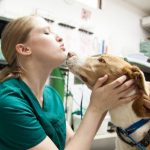
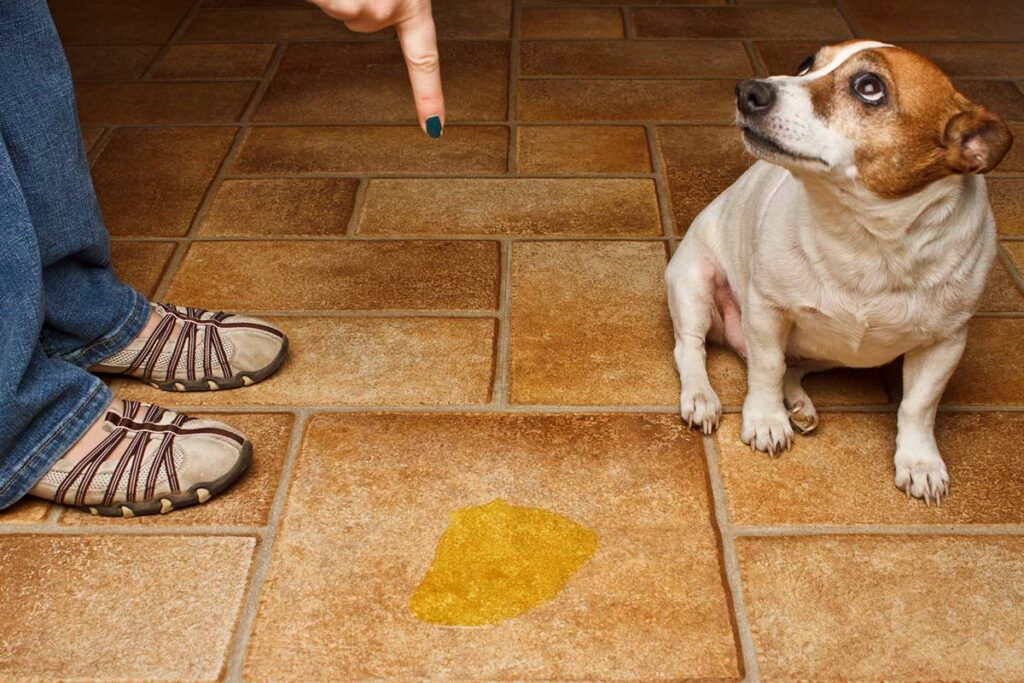
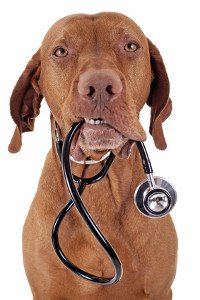
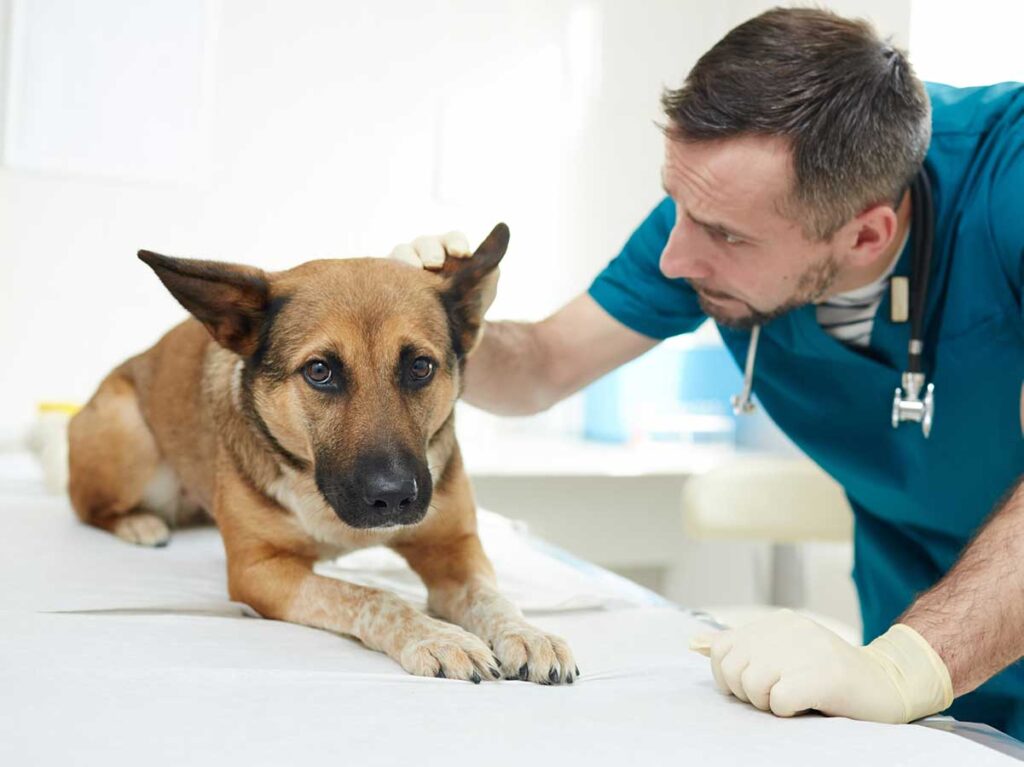
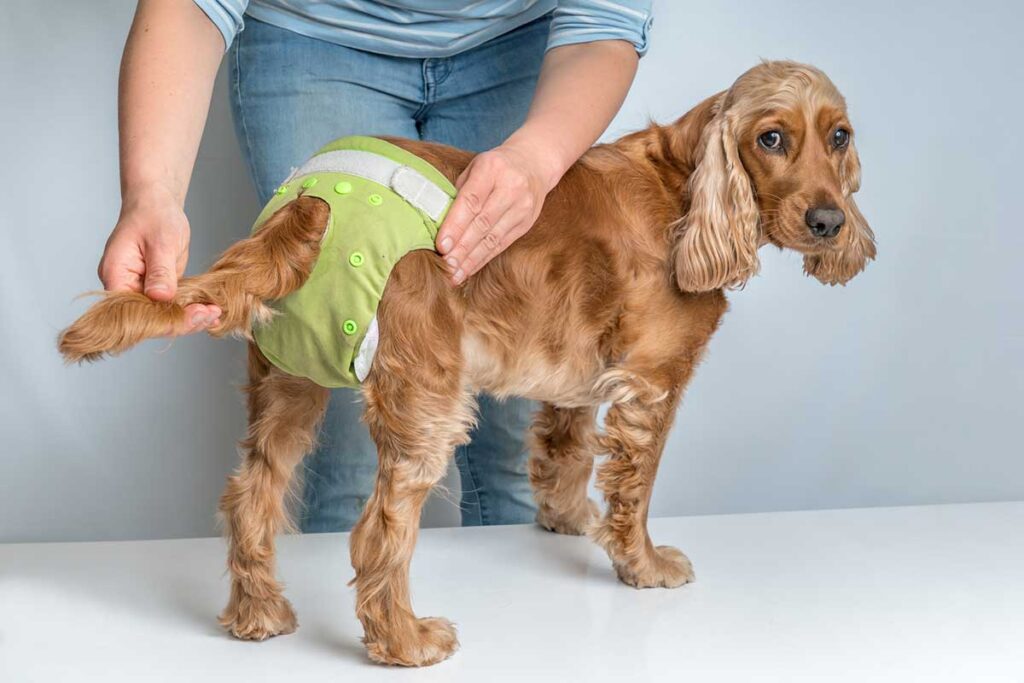


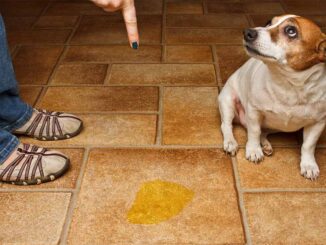
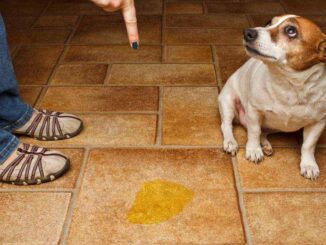
Thank you for this caring article. It cleared up a few things.
What about removing water bowl at night? Our senior Wales us at 4 a.m. to go out and pee??
I have a 15 y/o Dachshund who occasionally is sleeping so deeply that she urinates without waking up. Putting a pee pad under her, both in her bed and mine when we settle in for the night, has definitely helped in keeping the floor and my bed dry. The information in this blog is hugely helpful. I’ll definitely be trying some of the recommendations. Thanks for the great information
My dog just started to be poop incontinent. I really appreciate the clarity of this article and will be making a vet appointment asap. Thanks also for the discussion about doggie diapers. It’s really helpful to read about the many options.